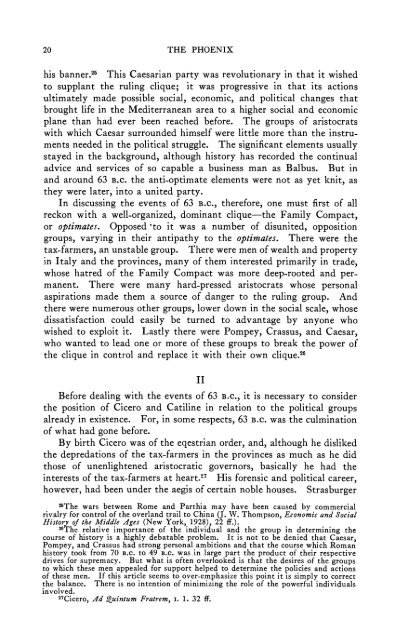Catiline and the "Concordia Ordinum" - Historia Antigua
Catiline and the "Concordia Ordinum" - Historia Antigua
Catiline and the "Concordia Ordinum" - Historia Antigua
Create successful ePaper yourself
Turn your PDF publications into a flip-book with our unique Google optimized e-Paper software.
20 THE PHOENIX<br />
his banner.25 This Caesarian party was revolutionary in that it wished<br />
to supplant <strong>the</strong> ruling clique; it was progressive in that its actions<br />
ultimately made possible social, economic, <strong>and</strong> political changes that<br />
brought life in <strong>the</strong> Mediterranean area to a higher social <strong>and</strong> economic<br />
plane than had ever been reached before. The groups of aristocrats<br />
with which Caesar surrounded himself were little more than <strong>the</strong> instruments<br />
needed in <strong>the</strong> political struggle. The significant elements usually<br />
stayed in <strong>the</strong> background, although history has recorded <strong>the</strong> continual<br />
advice <strong>and</strong> services of so capable a business man as Balbus. But in<br />
<strong>and</strong> around 63 B.C. <strong>the</strong> anti-optimate elements were not as yet knit, as<br />
<strong>the</strong>y were later, into a united party.<br />
In discussing <strong>the</strong> events of 63 B.C., <strong>the</strong>refore, one must first of all<br />
reckon with a well-organized, dominant clique-<strong>the</strong> Family Compact,<br />
or optimates. Opposed'to it was a number of disunited, opposition<br />
groups, varying in <strong>the</strong>ir antipathy to <strong>the</strong> optimates. There were <strong>the</strong><br />
tax-farmers, an unstable group. There were men of wealth <strong>and</strong> property<br />
in Italy <strong>and</strong> <strong>the</strong> provinces, many of <strong>the</strong>m interested primarily in trade,<br />
whose hatred of <strong>the</strong> Family Compact was more deep-rooted <strong>and</strong> permanent.<br />
There were many hard-pressed aristocrats whose personal<br />
aspirations made <strong>the</strong>m a source of danger to <strong>the</strong> ruling group. And<br />
<strong>the</strong>re were numerous o<strong>the</strong>r groups, lower down in <strong>the</strong> social scale, whose<br />
dissatisfaction could easily be turned to advantage by anyone who<br />
wished to exploit it. Lastly <strong>the</strong>re were Pompey, Crassus, <strong>and</strong> Caesar,<br />
who wanted to lead one or more of <strong>the</strong>se groups to break <strong>the</strong> power of<br />
<strong>the</strong> clique in control <strong>and</strong> replace it with <strong>the</strong>ir own clique.26<br />
II<br />
Before dealing with <strong>the</strong> events of 63 B.C., it is necessary to consider<br />
<strong>the</strong> position of Cicero <strong>and</strong> <strong>Catiline</strong> in relation to <strong>the</strong> political groups<br />
already in existence. For, in some respects, 63 B.C. was <strong>the</strong> culmination<br />
of what had gone before.<br />
By birth Cicero was of <strong>the</strong> eqestrian order, <strong>and</strong>, although he disliked<br />
<strong>the</strong> depredations of <strong>the</strong> tax-farmers in <strong>the</strong> provinces as much as he did<br />
those of unenlightened aristocratic governors, basically he had <strong>the</strong><br />
interests of <strong>the</strong> tax-farmers at heart.27 His forensic <strong>and</strong> political career,<br />
however, had been under <strong>the</strong> aegis of certain noble houses. Strasburger<br />
5The wars between Rome <strong>and</strong> Parthia may have been caused by commercial<br />
rivalry for control of <strong>the</strong> overl<strong>and</strong> trail to China (J. W. Thompson, Economic <strong>and</strong> Social<br />
History of <strong>the</strong> Middle Ages (New York, 1928), 22 ff.).<br />
26The relative importance of <strong>the</strong> individual <strong>and</strong> <strong>the</strong> group in determining <strong>the</strong><br />
course of history is a highly debatable problem. It is not to be denied that Caesar,<br />
Pompey, <strong>and</strong> Crassus had strong personal ambitions <strong>and</strong> that <strong>the</strong> course which Roman<br />
history took from 70 B.C. to 49 B.C. was in large part <strong>the</strong> product of <strong>the</strong>ir respective<br />
drives for supremacy. But what is often overlooked is that <strong>the</strong> desires of <strong>the</strong> groups<br />
to which <strong>the</strong>se men appealed for support helped to determine <strong>the</strong> policies <strong>and</strong> actions<br />
of <strong>the</strong>se men. If this article seems to over-emphasize this point it is simply to correct<br />
<strong>the</strong> balance. There is no intention of minimizing <strong>the</strong> role of <strong>the</strong> powerful individuals<br />
involved.<br />
27Cicero, Ad Quintum Fratrem, I. 1. 32 ff.

















